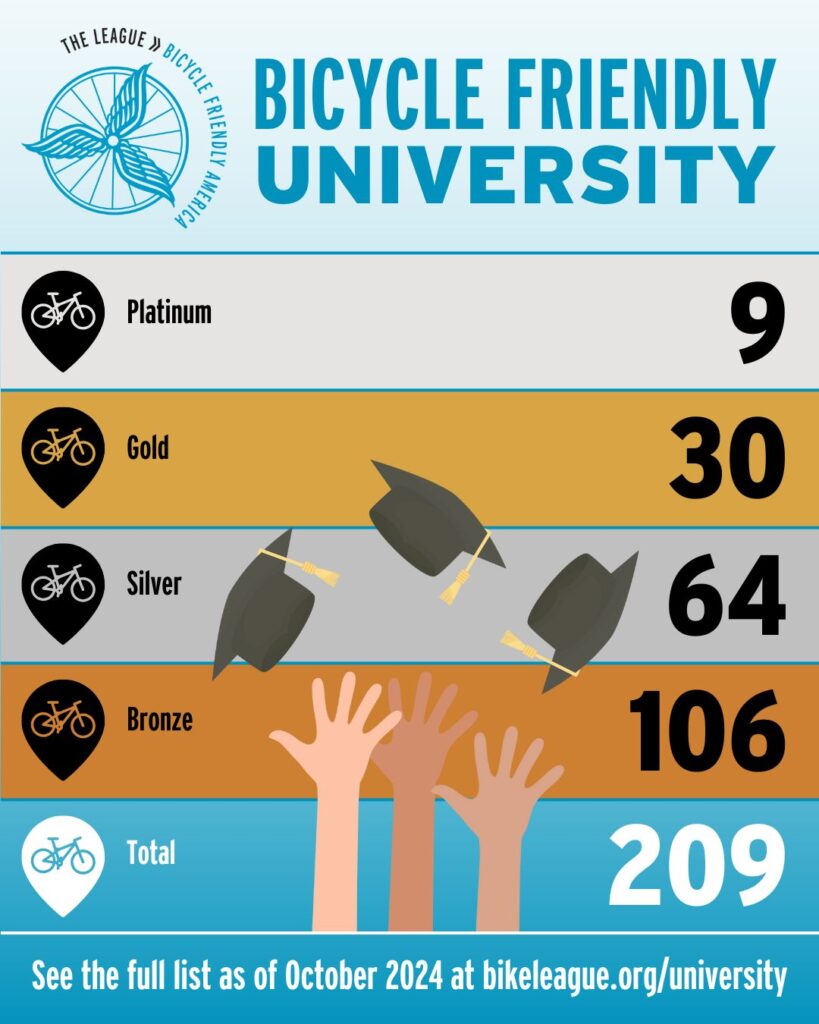DISCOVER YOUR LOCAL BICYCLING COMMUNITY
Find local advocacy groups, bike shops, instructors, clubs, classes and more!
Celebrating 42 New and Renewing Bicycle Friendly Universities during Campus Sustainability Month
WASHINGTON, DC — The League of American Bicyclists is proud to celebrate 42 institutes of higher education in this year’s round of Bicycle Friendly University (BFU) awards, with an additional three institutions earning Honorable Mentions. Among the 42 awardees, eleven campuses are renewing their Gold-level BFU designations, and one campus, the University of Minnesota Twin Cities, is renewing their Platinum-level designation. The entire cohort of new and renewing awardees brings the total number of Bicycle Friendly Universities to 209 nationwide, each joining a network of peers united by a shared commitment to creating a Bicycle Friendly America for all.
“When universities make biking easier, safer, and more accessible, they’re not just helping students get from point A to point B—they’re leading the charge in creating a more sustainable future,” said Bill Nesper, executive director of the League of American Bicyclists. “By prioritizing better biking, Bicycle Friendly Universities are empowering students and staff to make choices that benefit their health, their environment, and their communities.”
This celebration is particularly salient during Campus Sustainability Month, a time when many members of the higher education community are taking stock of their sustainability initiatives and looking to peer institutions to inspire best practices and future goals. Bicycle Friendly Universities are the standard-bearers among campuses, as their commitment to better biking is an investment in the next generation. By equipping young leaders with the tools to address climate challenges and prioritize sustainable transportation solutions, BFUs are taking steps to empower their students to forge a more livable future.

In Oregon, both the University of Oregon in Eugene and Oregon State University in Corvallis are renewing at the Gold level, in part thanks to both schools’ strong commitments to sustainability and climate strategies. The University of Oregon’s Comprehensive Environmental Policy “supports alternatives to commuting by single occupancy vehicles and encourages students, employees and guests to use alternatives that minimize environmental impact.” Meanwhile, Oregon State University has pledged to “reduce drive-alone commute trips to the Corvallis campus by one-third, from 30% today to 20% by 2030.”
A similar spirit is echoed by Luther College of Decorah, Iowa. “Luther College’s commitment to bicycling is grounded within a deep commitment to sustainability and community. Luther’s Center for Sustainable Communities has been the home for the bicycle share program, and the home base for three iterations of student groups over the past decade, including the most recent group that has bridged beyond student participation to establish a more long-lasting, permanent Bicycle Advisory Committee that includes students, faculty, staff and administrators.”

Notably, Luther College received a Silver award based on the college’s first-ever application in 2024. Five other campuses received Bronze-level recognition on their first time applications this year, and three campuses received Honorable Mention. The BFU program is not a participation trophy; it’s an intensive tool for colleges and universities to assess their efforts, benchmark progress, and receive actionable feedback. From Bronze to the as-of-yet-unachieved Diamond level, each award designation requires demonstrated, continuous effort to maintain. In this round, one school moved down in award level from Silver to Bronze, while two others—Cornell University and Oklahoma State University—returned to the list after their previous BFU designations expired. Twenty-two schools did not renew their awards this year and were removed from the list of current BFU awardees.
The challenges of recent years, including the lingering impact of the COVID-19 pandemic, have tested universities’ commitment to biking initiatives. “In honesty, we lost momentum due to COVID,” said a representative of the University of Tulsa, a renewing Bronze BFU. “In submitting this application, I am hoping to get feedback to help improve our campus in regard to being bicycle friendly.”
This round serves as a reminder that achieving and maintaining a Bicycle Friendly University designation demands continuous effort, but each step—or pedal stroke—toward better biking contributes to a healthier, more sustainable future. From expanding bike infrastructure to fostering a culture of active transportation, campuses nationwide are finding creative ways to keep the wheels of progress turning.
Find the full list of 42 new and renewing BFUs & Honorable Mentions here.
If your university would like to join the League’s growing movement to build safe streets for all and a Bicycle Friendly America for everyone, submissions for the 2025 round of the Bicycle Friendly University program are due by August 7, 2025.
About the Bicycle Friendly University℠ Program
Bicycle Friendly University awards reflect local leaders’ ongoing work to build better places to bike and evaluate those efforts as part of a national movement. Each of the five levels of the Bicycle Friendly University award – diamond, platinum, gold, silver, and bronze, plus an honorable mention category – provide a clear path for businesses to continuously improve. Visit bikeleague.org/university to learn more about the BFU program.
About the League Of American Bicyclists
Since 1880, the League of American Bicyclists has been people-powered, with a goal to make bicycling safer and easier as a means of transportation and recreation. Today, the League continues to improve lives and strengthen communities through bicycling. We are more than 200,000 members and supporters strong with more than 1,000 state and local advocacy groups and bike clubs as well as thousands of businesses, universities, and communities together leading the movement to create a Bicycle Friendly America for everyone.